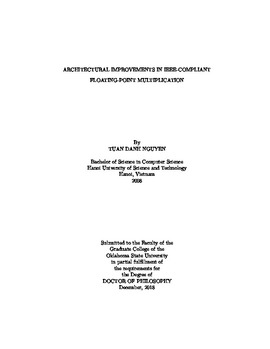| dc.contributor.advisor | Stine, James E. | |
| dc.contributor.author | Nguyen, Tuan Danh | |
| dc.date.accessioned | 2019-07-19T14:33:29Z | |
| dc.date.available | 2019-07-19T14:33:29Z | |
| dc.date.issued | 2018-12-01 | |
| dc.identifier.uri | https://hdl.handle.net/11244/320978 | |
| dc.description.abstract | Multiplication has long been an important part of any computer architecture. It has usually been a common case for most computer architecture decisions to include in any microarchitecture. However, the difficulty in creating hardware for multiplication because of its inherent shifting of the radix point has been a cogent reason for the need for floating-point hardware in scientific applications. The IEEE 754 floating-point standard was originally ratified in 1985 and later amended in 2008 to make floating-point multiplication easier for users to implement applications. Although floating-point arithmetic creates a mechanism to make things easier for using multiplication, it is complicated both algorithmically and practically for hardware implementations. | |
| dc.description.abstract | This dissertation discusses possible architectural improvements in IEEE-compliant floating-point multiplication for Machine Learning/Deep Learning applications. First, a combined IEEE half and single precision floating-point multipliers is proposed to reduce power dissipation for Deep Learning applications. Second, a novel rounding scheme is proposed that is simpler but comparable with the state-of-the-art rounding schemes. Third, an optimized design is proposed that can handle both denormal and normal numbers. Finally, a hybrid precision design is proposed, aiming to improve the power consumption of Machine Learning/Deep Learning applications. Proposed designs are targeted to Machine Learning/Deep Learning applications-specific processors to improve the latency and power consumption. All designs are implemented in RTL-level Verilog, verified for correctness against open-source TestFloat generated test vectors, and synthesized using an ARM 32nm CMOS library for Global Foundries (GF) cmos32soi technology for estimated power, area and delay analysis. | |
| dc.format | application/pdf | |
| dc.language | en_US | |
| dc.rights | Copyright is held by the author who has granted the Oklahoma State University Library the non-exclusive right to share this material in its institutional repository. Contact Digital Library Services at lib-dls@okstate.edu or 405-744-9161 for the permission policy on the use, reproduction or distribution of this material. | |
| dc.title | Architectural Improvements in IEEE-Compliant Floating-Point Multiplication | |
| dc.contributor.committeeMember | Teague, Keith A. | |
| dc.contributor.committeeMember | Latino, Carl D. | |
| dc.contributor.committeeMember | DeYong, Camille F. | |
| osu.filename | Nguyen_okstate_0664D_16076.pdf | |
| osu.accesstype | Open Access | |
| dc.description.department | Electrical Engineering | |
| dc.type.genre | Dissertation | |
| dc.type.material | Text | |
